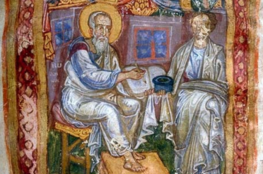Responses to my previous post, “The Problem of Staying Orthodox,” were far more positive than I anticipated, particularly on social media. That did not stop some people from accusing me of everything from racism to ignoring the problems in the Catholic Church, however. Others suggested that I was attempting to pitch Catholicism as a paradisiacal ecclesiastical unit that has somehow escaped the contradictions, compromises, and capitulations found in Orthodoxy. Nonsense. I am quite aware, for instance, how depressingly few Catholics follow the Church’s infallible teaching on contraception; and when it comes to the contemporary annulment process, it’s not noticeably different in practice from the Orthodox Church’s willingness to allow second and third marriages. Catholicism, by virtue of being at least four times larger than Orthodoxy, is beset by far more visible problems than the Orthodox Church. When a scandal breaks out in the Catholic Church, it’s featured in the New York Times; when an equally revolting scandal afflicts the Orthodox, it’s a shock when any major news outlet makes mention of it at all. The closest Orthodoxy comes to getting “bad press” in the West is when the Russian Church is accused of directing state policy on matters such as abortion, homosexuality, and domestic abuse. Perhaps this is why certain Orthodox, particularly those living in the West, are especially sensitive to criticism of their confession; they’re just not used to it. Catholics on the other hand have grown accustomed to priest sex-abuse jokes on late night television.
Among those Orthodox Christians who happened to agree with much of what I wrote, a few asked if I would have more to say on the topic of trying to persevere as an Orthodox Christian, particularly in the United States. Speaking as someone who opted not to remain Orthodox but rather return to the confessional haunt of his childhood (Greek Catholicism), I don’t feel fit to give advice. Still, I imagine that staying Orthodox can be just as challenging as staying Greek Catholic, albeit for very different reasons. Although both are minority churches forced to get by outside of their historic environments, the Orthodox are often able to define themselves by negation: “not Catholic”; “not Western”; “not rationalistic”; etc. Greek Catholics, though “not Western” in the limited sense that their liturgy, spirituality, and theology emerged in the geographic East, must strike a balancing act between being true to their authentic patrimony while not discarding certain irrevocable tenets of the Faith which their estranged Orthodox brethren need not worry about (e.g., Purgatory, Papal Primacy, and the Immaculate Conception). At the same time, Greek Catholics are often compelled to “compete” with their not-so-estranged Latin Catholic brethren who continue to their own liturgy, spirituality, and theology as normative for the Universal Church. Even today, more than 50 years after Orientalium ecclesiarium, Eastern Catholics in general, and Greek Catholics in particular, are largely thought of in terms of ritual differences rather than ecclesiastic integrity.
Comparatively, the Orthodox are free to steer clear of Latin Catholicism altogether under the guise of promoting “pure Orthodoxy.” The problem is that there is no such thing as “pure Orthodoxy,” especially at this stage in history. “Pure Orthodoxy” is often little more than ideologically charged Orthodoxy which lacks both a sense of history and a universal vision. In the hands of ex-Protestant converts, for example, “pure Orthodoxy” looks astonishingly like American Evangelicalism, only with less guitars and more icons. And for those who came to Orthodoxy out of cultural disaffection, spiritual confusion, or intellectual vapidity, “pure Orthodoxy” is frighteningly nationalistic, insular, and apocalyptic. Not everyone buys into “pure Orthodoxy,” of course. There are those who hold to Orthodoxy because it has the luxury of being both sacramental and (apparently) non-magisterial; messy doctrinal questions such as universalism can be bypassed with the claim that the issue has never been “dogmatically defined.” This form of Orthodoxy, not surprisingly, often comes accompanied with a strong antinomian streak.
These problems—and more—are worth exploring in depth, but probably not here. Nothing I have touched on so far gets into the fraught territory of how a number of women experience Orthodoxy and, in surprising numbers, feel alienated if not abused by its male-dominated, pseudo-monastic culture. Because Orthodoxy is often promoted as being “more masculine” than other forms of Christianity, it’s not surprising that women should find it so inhospitable. However, given that I am not a woman, I feel that I would be doing a disservice to this concern by trying to speculate too much. I have heard enough horror stories in my time to know that this concern is a very genuine one which the Orthodox Church would do well to confront head-on sooner rather than later.
With that said, I am going to close the book on this topic for now by repeating my hope for the emergence of what Fr. Robert Taft, S.J. has called “self-critical Orthodoxy.” This self-critical Orthodoxy must not be merely an academic exercise but rather an open and public discussion carried out in charity and truth. It will no doubt be painful, but that is what makes it so necessary.



